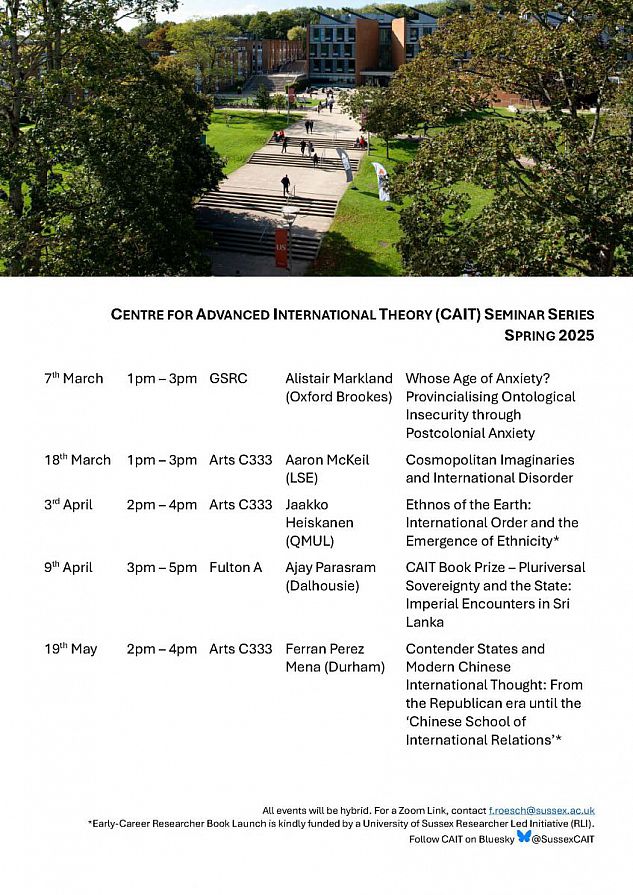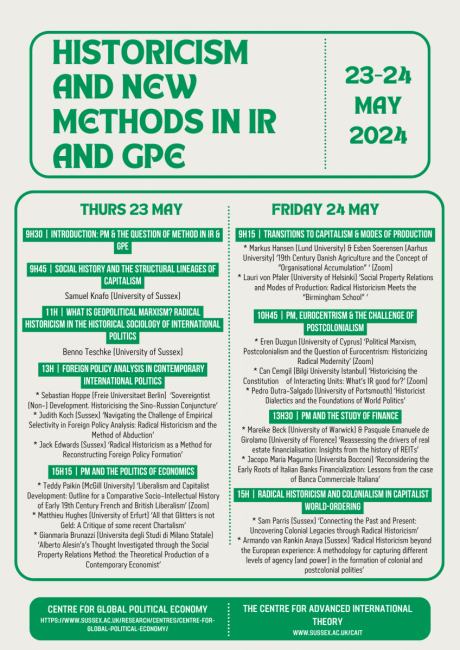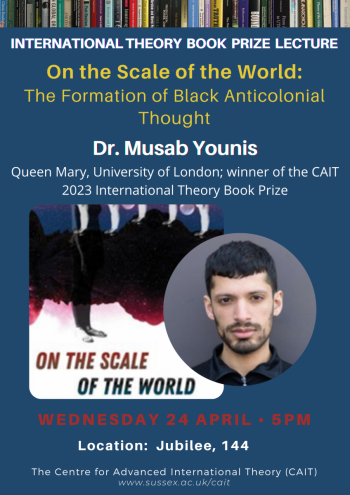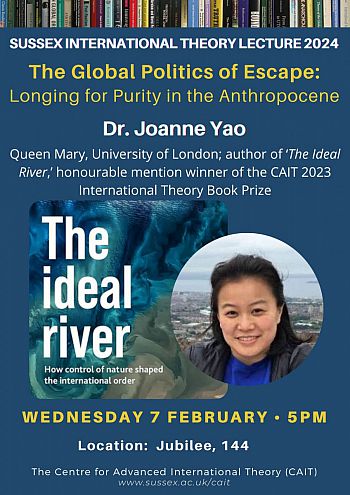About us
Learn more about CAIT and the people who work here.
We’re encouraging innovative theoretical research in International Relations.
We have a number of speakers delivering talks on a range of topics.

Or download the Programme here
On Wednesday 9 April 2025, 4 - 6pm, the Centre for Advanced International Theory (CAIT) are holding their Sussex International Theory Book Prize Lecture, featuring prize winner Ajay Parasram (Dalhousie University). Ajay's book "Pluriversal Sovereignty and the State: Imperial Encounters in Sri Lanka" won the 2024 International Theory Book Prize.
The book documents the political and cosmological processes through which the idea of “total territorial rule” at the core of the modern international system came into being in the context of early to mid-nineteenth-century Ceylon (Sri Lanka). It develops a decolonial theoretical framework informed by a “pluriverse” of multiple ontologies of sovereignty to argue that the territorial state itself is an outcome of imperial globalization. Anti-colonialism up to the mid nineteenth century was grounded in genealogies and practices of sovereignty that developed in many localities. By the mid to late nineteenth century, however, the global state system and the states within it were forming through colonizing and anti-colonizing vectors. The modern territorial state predates modern nationalism and created a contaminated container in which anticolonialism had been constricted by the late nineteenth century in Ceylon, but also elsewhere in the British Empire. By focusing on the ontological conflicts that shaped the state and empire, we can rethink the birth of the British Raj and place it in Ceylon some fifty years earlier than in India. In this way, the book makes a theoretical contribution to postcolonial and decolonial studies in globalization and international relations by considering the ontological significance of “total territorial rule” as it emerged historically in Ceylon. Through emphasizing one important manifestation of modernity and coloniality - the territorial state - the book contributes to research that studies the politics of ontological diversity, sovereignty, postcolonial and decolonial international studies, and globalization through colonial encounters.
Ajay is an Associate Professor in International Development Studies and History at Dalhousie University in Kjipuktuk, Mi'kma'ki.
The special lecture will take place in Fulton A or, if you are unable to attend in-peron, you can email cait@sussex.ac.uk for Zoom details to join in online.
On the 23rd and 24th May 2024, the Centre for Advanced International Theory (CAIT) and Centre for Global Political Economy (CGPE) are holding a workshop on ‘Historicism and New Methods in IR and GPE.’ The workshop takes place over 2 days and features academics from Sussex and across the world.
The purpose of the workshop is to come together to explore the question of method in PM across the subfields of GPE, especially in finance and political economy, and IR, especially in the Historical Sociology of International Relations. While the workshop programme showcases the diversity and richness of PM-inspired research, we would like to direct the presentations and discussions to the common underlying theme of how to conduct historicisation in methodologically self-reflexive and rigorous ways. To this end, we would like all participants to address the following core questions:
What is your conception of historicism as a method of analysis?
How is it grounded in PM, Marxism or cognate traditions?
What does it add/change in terms of your substantive research agenda?
What challenges have you faced developing this perspective in relation to your historical focus?
The venue is C333. MA and PhD students are encouraged to attend.

This year's Prize lecture was delivered by Dr. Musab Younis whose book "On the Scale of the World: The Formation of Black Anticolonial Thought" won the 2023 International Theory Book Prize. The book provides an original, anticolonial conception of ‘the international’ that foregrounded and operated through the planetary scale. This anti-imperial conception considered race as constitutive of Eurocentric imperialist conceptions of the world by elucidating the ways in which racial ‘epidermalization’ was fundamentally bound up with planetary processes. Black Atlantic anti-colonial and anti-racist struggles at national level were therefore conceived of and fought in internationalist terms. The argument is based on painstaking research into archives of both English- and French-language anticolonial writing in France, the United States, and West Africa. On the Scale of the World offers a set of major theoretical advances that privilege Black interwar, anticolonial literary and political writings as sources of international theory. These theoretical insights are housed within international studies but speak directly to scholars of History, Geography, Literary Studies, and critical theory. Three contributions deserve mention. First, the book’s reading of interwar Black Atlantic print cultures, especially newspapers, demonstrates the textual mechanisms by which international theory has been produced and travelled ‘from below’. Second, the book’s novel conception of scale enriches and transforms key concepts in international studies, showing how ideas of global order have never simply been the exclusive preserve of Western privileged actors. And third, On the Scale of the World implicitly addresses nativist and culturalist charges against postcolonialism by demonstrating the consciously and intrinsically world-historical cast of Black Atlantic internationalism and nationalism.
Dr. Younis is Senior Lecturer in Politics and International Relations at Queen Mary, University of London.

Our lectures acknowledge the interdisciplinary influences of international theory. They touch on core concerns of international theorising and acknowledge the interdisciplinary influences of international theory. Previous speakers have included Priyamvada Gopal, Yanis Varoufakis, Vivek Chibber and Wendy Brown.
If you want to suggest a speaker or topic, or if you look for further information, please contact cait@sussex.ac.uk.
This year's 2024 lecture, Dr. Joanne Yao (Queen Mary University of London) delivered a lecture on “The Global Politics of Escape: Longing for Purity in the Anthropocene”. The lecture was followed by a drinks Reception in the Jubilee cafe.
Joanne’s book The Ideal River: How Control of Nature Shaped the International Order (2022) won an honourable mention in CAIT’s 2023 book prize competition.

With Dr. Joanne Yao of Queen Mary, University of London. Joanne presents “The Global Politics of Escape: Longing for Purity in the Anthropocene”. The lecture takes place at 5pm in Jubilee 144, followed by a drinks Reception in the Jubilee cafe at 6pm
Joanne’s book The Ideal River: How Control of Nature Shaped the International Order (2022) won an honourable mention in CAIT’s 2023 book prize competition
Our abstracts workshops are designed to encourage the exchange of ideas and feedback of those in the department and the university interested in international theory at the early stages of research. Anyone interested in participating should send their Abstracts to Kamran Matin by the 10th February
This 2 hour event is an opportunity for all those attending to discuss Dr. Musab Younis' 2022 book "On the Scale of the World: The Formation of Black Anticolonial Thought." The book was the winner of the 2023 Sussex International Theory Prize. The lecture takes place in Fulton House 204.
Dr. Musab Younis joins CAIT to deliver our annual Theory Prize Lecture on his book "On the Scale of the World: The Formation of Black Anticolonial Thought" The lecture takes place at 5pm in Jubilee 144, followed by a drinks Reception in the Jubilee cafe at 6pm
This lecture is co-hosted with Research in Progress (RiP )and features speakers Felix Rösch and Atsuko Watanabe
CAIT is joined by Dr. Patrick Quinton-Brown for the launch of his book. The lecture takes place online at https://universityofsussex.zoom.us/j/99044595621
If you have any questions, email cait@sussex.ac.uk.